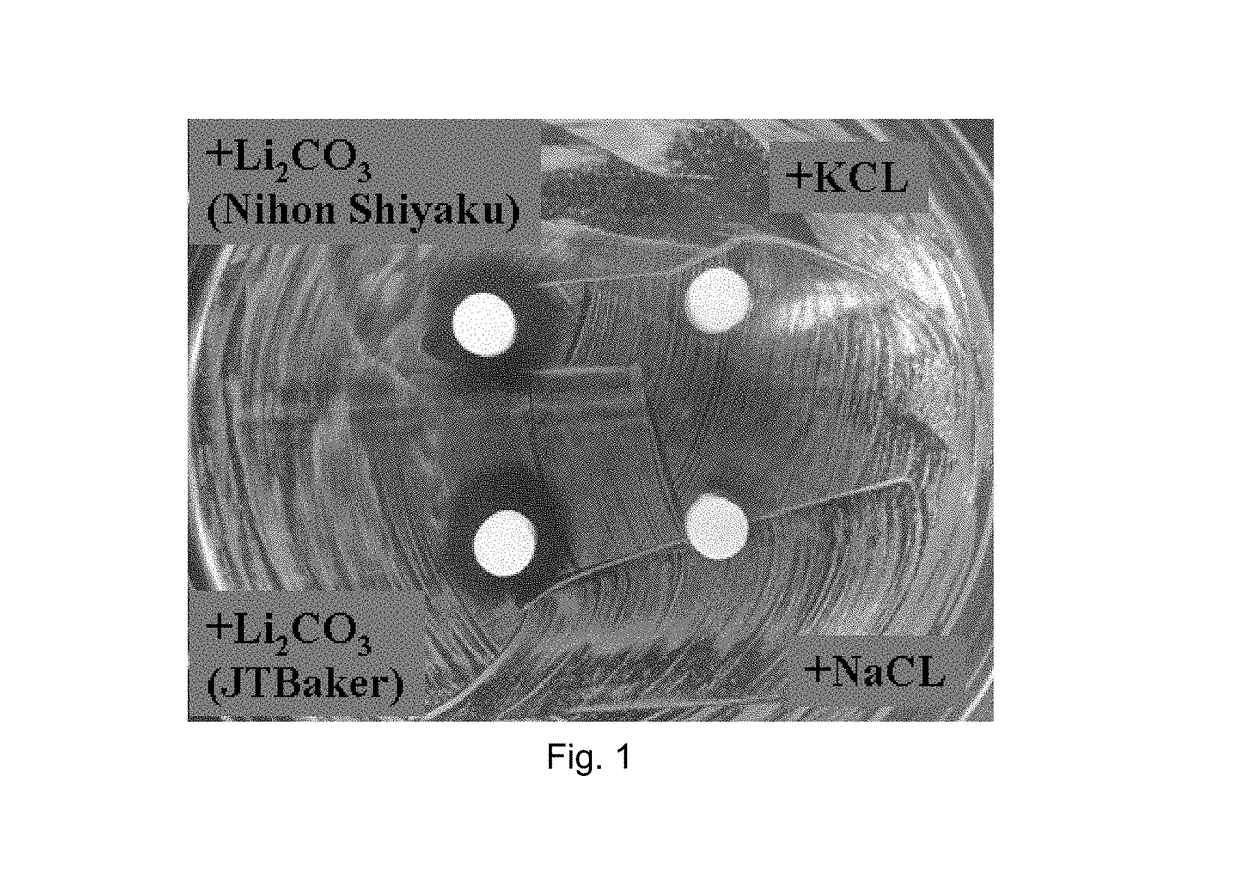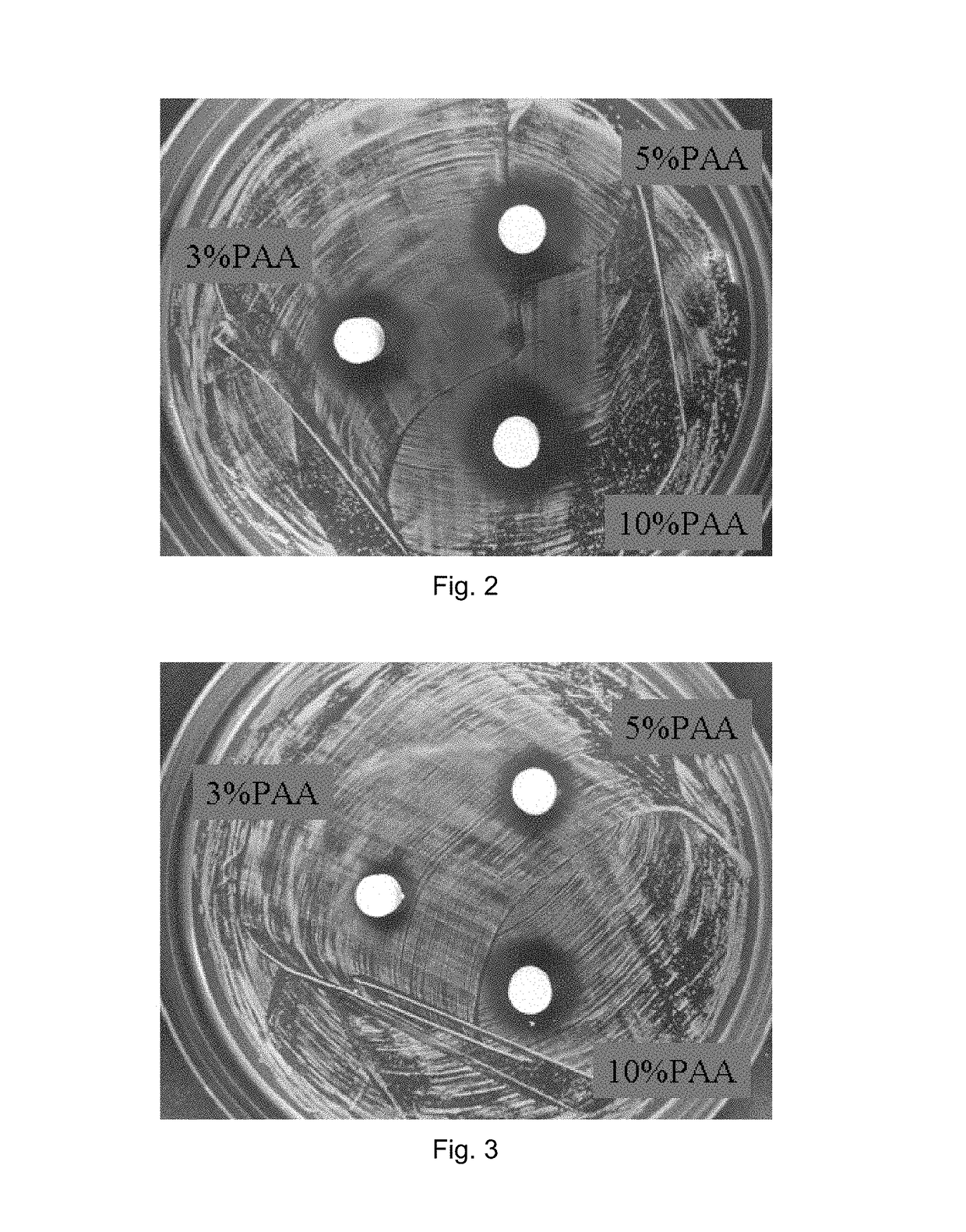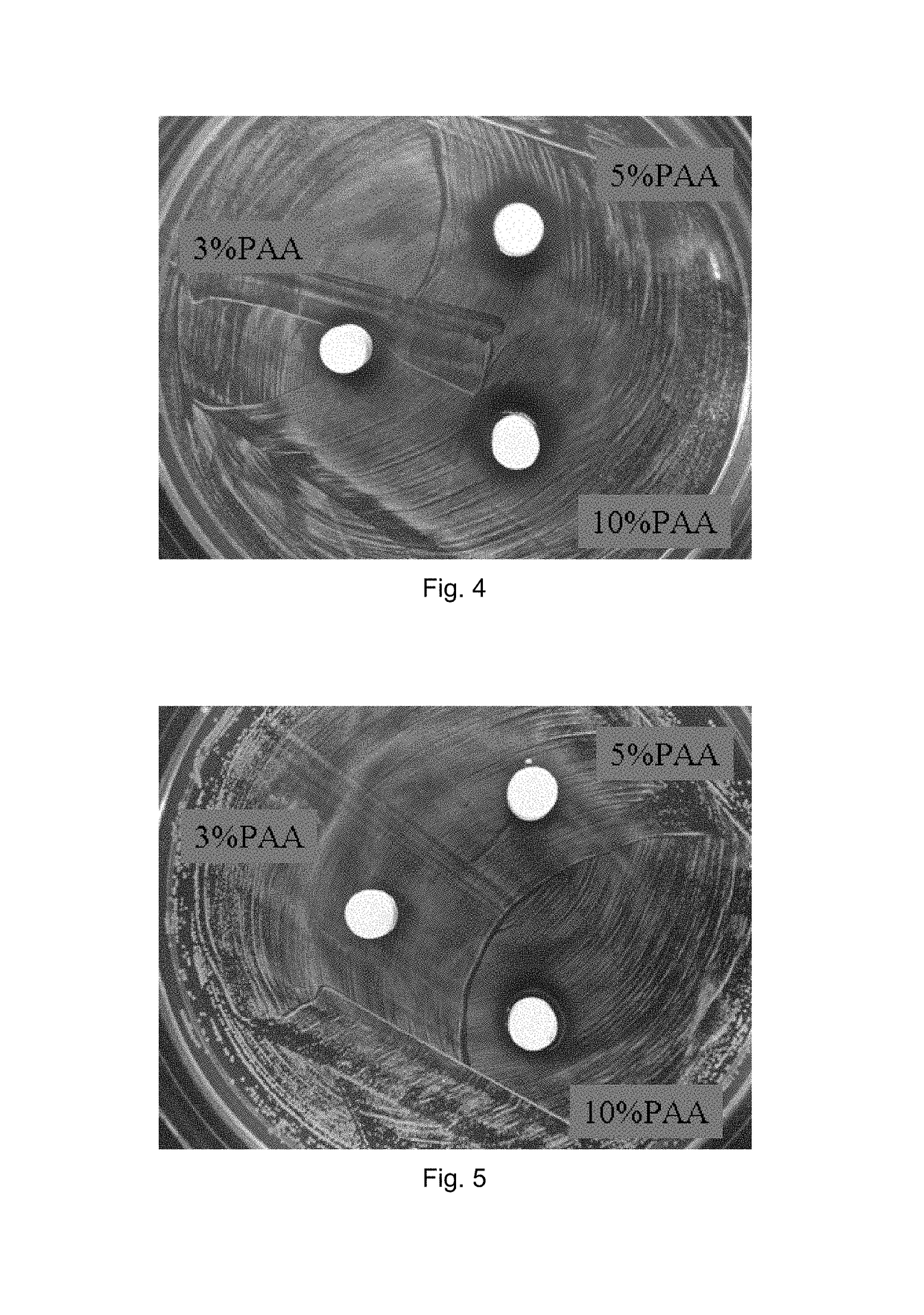Antibacterial calcium-based materials
a calcium-based material and antibacterial technology, applied in the direction of antibacterial agents, drug compositions, prostheses, etc., can solve the problems of 100 times the concentration of antibiotics, difficult removal, and persistent infections of biomedical devices and implants, and achieve the effect of enhancing the bioresorption rate of implants and negative response of surrounding tissues
- Summary
- Abstract
- Description
- Claims
- Application Information
AI Technical Summary
Benefits of technology
Problems solved by technology
Method used
Image
Examples
example 1
rial Test on Commercially Pure Lithium Salts
[0090]Antibacterial tests were conducted on a series of commercially pure lithium compounds, including Li2SO4, Li3PO4, Li2CO3, Li2O, and LiF.
[0091]Samples were either dry-molded under a pressure of 450 kgf into a 3 mm high, 6 mm dia. cylinder without being mixed with a setting solution, or wet-molded under 1.4 MPa into a 3 mm high, 6 mm dia. cylinder with being mixed with a 0.6 M (NH4)2HPO4 setting solution at L / P ratios 0.2-0.6 (0.20 for Li2SO4, 0.25 for Li3PO4, 0.60 for Li2CO3)
Results:
[0092](1) All tested lithium compounds (Li2SO4, Li3PO4, Li2CO3, Li2O and LiF) demonstrate a high antibacterial behavior.[0093](2) Except Li2CO3, all dry-molded (without being mixed with a setting solution) lithium compounds are more or less disintegrated / dissolved in TSB agar plate.[0094](3) All wet-molded (mixed with 0.6 M (NH4)2HPO4 at L / P=0.2-0.6 cc / g) Li compounds do not disintegrate in TSB agar plate.[0095](4) Wet-molded Li2SO4 and Li2CO3 samples show ...
example 2
rial Behavior and Other Tests of TTCP / Li Salt and TTCP / Li Salt / PAA Samples
[0096]Immersion, pH measurement, weight loss, cytotoxicity and antibacterial tests were conducted on TTCP / Li and TTCP / Li / PAA block samples.
[0097]The TTCP / Li / PAA blocks were prepared by mixing appropriate amounts of TTCP powder and Li2CO3 powder (TTCP:Li2CO3=1:1 by weight) to obtain a TTCP / Li2CO3 mixed powder. The TTCP / Li2CO3 powder was mixed with 0.6M (NH4)2HPO4 setting solution containing 3, 5, or 10 vol % PAA solution at L / P ratio of 0.45 cc / g to obtain a TTCP / Li / PAA cement paste. The TTCP / Li / PAA block samples were prepared from pressure-molding the TTCP / Li / PAA cement paste under a pressure of 450 kgf.
[0098]
TABLE 3Average diameters (mm) of antibacterial zones of TTCP / Li / PAAblocks immersed in Hanks' solution for different periods oftime (days).1 d2 d3 d5 d7 d 3% PAA11.410.38.566 5% PAA11.511.411.36610% PAA12.612.511.76.76(Note: The measured antibacterial zones include 6 mm dia. sample)
Results:[0099](1) The ad...
example 3
rial Behavior and Other Tests of TTCP / DCPA / Li Salt and TTCP / DCPA / Li Salt / PAA Samples
[0112]Immersion, pH measurement, weight loss, cytotoxicity and antibacterial tests were conducted on TTCP / DCPA / Li and TTCP / DCPA / Li / PAA block samples.
[0113]The TTCP / DCPA / Li blocks were prepared by mixing appropriate amounts of TTCP / DCPA powders (1:1 in molar ratio) and Li compound (Li2CO3 or Li2O) powder (Li2CO3 or Li20=10 wt % or 30 wt % of all powder components) to obtain a TTCP / DCPA / Li compound mixed powder. The TTCP / DCPA / Li compound powder was mixed with 0.6 M (NH4)2HPO4 setting solution with L / P ratio of 0.35 to obtain a TTCP / DCPA / Li cement paste. The 3 mm high, 6 mm dia. block samples were prepared from pressure-molding the cement paste under a pressure of 1.4 MPa.
[0114]
TABLE 7pH values of the PBS extract of TTCP / DCPA / Li samples immersed in37° C. PBS for 24 hTTCP / TTCP / TTCP / Sample:PBSDCPA:Li2CO3 =DCPA:Li2CO3 =DCPA:Li2O =(weight ratio)90:10 by weight70:30 by weight90:10 by weight1:510.510.412.61:1...
PUM
| Property | Measurement | Unit |
|---|---|---|
| pressure | aaaaa | aaaaa |
| pressure | aaaaa | aaaaa |
| diameter | aaaaa | aaaaa |
Abstract
Description
Claims
Application Information
 Login to View More
Login to View More - R&D
- Intellectual Property
- Life Sciences
- Materials
- Tech Scout
- Unparalleled Data Quality
- Higher Quality Content
- 60% Fewer Hallucinations
Browse by: Latest US Patents, China's latest patents, Technical Efficacy Thesaurus, Application Domain, Technology Topic, Popular Technical Reports.
© 2025 PatSnap. All rights reserved.Legal|Privacy policy|Modern Slavery Act Transparency Statement|Sitemap|About US| Contact US: help@patsnap.com



